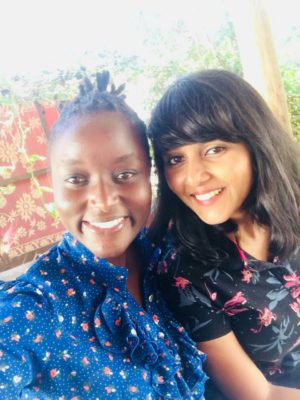
Sylviah(22) and Ayushi (23) german students
English:
Sylviah: „Nothing special. It was something completely normal to me.“
Ayushi: „Yes, for me the same. I knew about it before so it was like: okay, now it’s my time”.
Sylviah: „For me sanitary napkins were available so it was not a problem at all. But I think it’s a matter of education. I went to school in Kenya and there was an organized event for adolescents by women once a year who talked about menstrual hygiene and what they felt about themselves during their first period. They changed and helped me a lot. That’s when I realized that every women is going through the same thing and that I shouldn’t be shy to ask questions about it because it’s a normal thing for everyone.“
Ayushi: „That’s pretty cool. At my school here in Tanzania it wasn’t like that. There was no official information. I got to know more about it from the girls in class. But I would agree that education matters a lot and that it might be taboo to talk about it in some schools and families here as the cultures differ.“
German:
Sylviah: „Nichts Besonderes. Es war für mich etwas völlig Normales.“
Ayushi: „Für mich genauso. Ich wusste schon vorher darüber Bescheid und so war es für mich einfach: Okay, jetzt bin ich dran.“
Sylviah: „Ich hatte Zugang zu Binden, deswegen war es überhaupt kein Problem. Ich glaube aber, dass das mit der Bildung zusammenhängt. Ich bin in Kenia zur Schule gegangen und dort gab es jedes Jahr eine von Frauen organisierte Veranstaltung, bei der sie über Menstruationshygiene und ihre eigenen Erfahrung mit der ersten Periode geredet haben. Sie haben mich dadurch verändert und mir sehr geholfen. So habe ich gemerkt, dass jede Frau das gleiche durchmacht und dass ich nicht schüchtern sein sollte darüber Fragen zu stellen, da es für jeden etwas Normales ist.“
Ayushi: „Das ist ja cool. An meiner Schule hier in Tansania gab es so etwas nicht. Dort gab es keine offiziellen Informationen. Ich habe über die Mädchen aus meiner Klasse mehr darüber herausgefunden. Aber ich würde zustimmen, dass Bildung dabei eine große Rolle spielt und dass das immer noch in einigen Schulen und Familien in Tansania ein Tabu-Thema ist, da Kulturen sich unterscheiden.“